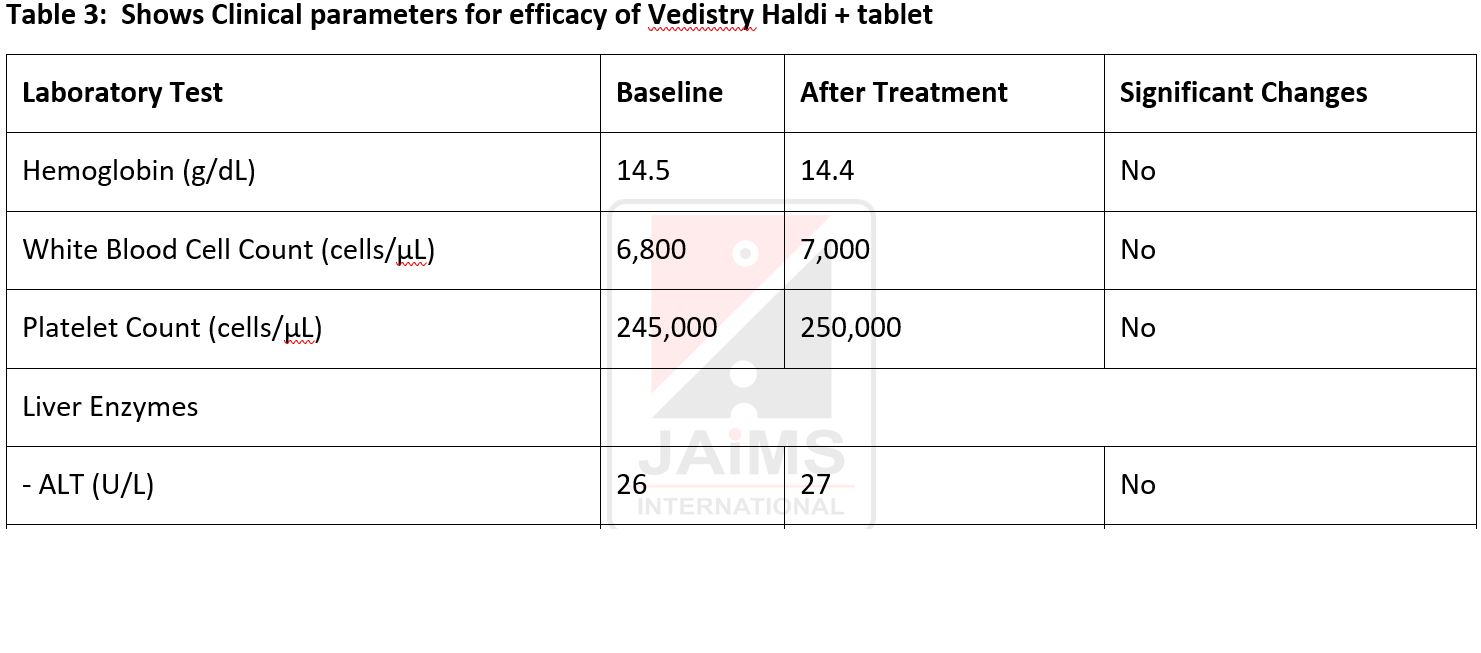Clinical trial to evaluate the safety and efficacy of Vedistry Haldi + Tablet in skin disease
DOI:
https://doi.org/10.21760/jaims.10.3.6Keywords:
Vedistry Haldi Tablet, Acne, Eczema, Inflammation, skin disease, skin healthAbstract
Background: Turmeric (Curcuma longa) is widely recognized for its medicinal properties, primarily due to its active compound, curcumin. Curcumin exhibits anti-inflammatory, antimicrobial, antioxidant, and anti-cancer effects, making it beneficial for skin health. It has traditionally been used to treat skin conditions such as acne, eczema, and inflammation.
Objective: To evaluate the clinical efficacy and safety of Vedistry Haldi + Tablet in managing skin health.
Methods: This phase 3, non-randomized, prospective open-label clinical trial evaluated the safety and efficacy of Vedistry Haldi + Tablet in 300 participants aged 18-65 years with chronic or recurrent skin conditions, including eczema, psoriasis, and acne. Participants were treated daily for 3 months.
Result: The clinical study evaluating Vedistry Haldi + Tablet demonstrated significant improvements in skin health among participants aged 18-65 years with chronic dermatological conditions. Participants showed reduced acne severity, hyperpigmentation, inflammation, and itching, along with enhanced skin hydration, texture, and tone. Quality of life scores improved notably, and serum markers like Vitamin C and antioxidants were elevated, indicating positive effects on skin health. Importantly, laboratory tests revealed no significant adverse changes in haematological, liver, or renal function, confirming the treatment’s safety. Vedistry Haldi + Tablet proved to be an effective and safe option for improving skin health and managing dermatological symptoms.
Conclusion: Overall, Vedistry Haldi + Tablet demonstrated substantial benefits in improving skin health without significant adverse effects, suggesting its potential as a safe and effective option for managing dermatological concerns.
Downloads
References
Vaughn, A. R., Branum, A., & Sivamani, R. K. (2016). Effects of turmeric (Curcuma longa) on skin health: A systematic review of the clinical evidence. Phytotherapy Research, 30(8), 1243–1264. https://doi.org/10.1002/ptr.5640
Ansari, M., & Munshi, Y. (2022). Haldi (Curcuma longa Linn.)—An important and effective home remedy: A review. Indian Journal of Unani Medicine, 15, 51-55. https://doi.org/10.53390/IJUM.2022.15109
Vaughn, A. R., Branum, A., & Sivamani, R. K. (2016). Effects of turmeric (Curcuma longa) on skin health: A systematic review of the clinical evidence. Phytotherapy Research, 30(8), 1243–1264. https://doi.org/10.1002/ptr.5640
Arthi, I., Rajagopal, P. L., Kumar, P. N. S., Mohan, A., & John, R. (2018). A review on medicinal plants used in certain skin diseases. International Journal of Novel Research and Development, 3(12), December. ISSN: 2456-4184.
Ansari, M., & Munshi, Y. (2022). Haldi (Curcuma longa Linn.)—An important and effective home remedy: A review. Indian Journal of Unani Medicine, 15, 51-55. https://doi.org/10.53390/IJUM.2022.15109
Anjali, M. R., et al. (2017). Piperine as a bioavailability enhancer: A review. Asian Journal of Pharmaceutical Analysis and Medicinal Chemistry, 5(1), 44-48.















